Unlike brick-and-mortar stores, around 46.25% of people return items bought online. Amazon also gets a lot of returns, and they liquidate it in pallets.
With multiple reselling avenues, you can buy them and make good profits or, just buy some cool stuff in bulk for yourself.
But where do you start? Where to buy overstocked and returned merchandise?
Here we will discuss where you can buy Amazon return pallets and give a cost overview or each. We'll also go through the details of making money with these pallets. Let's get started.
Note: I am not endorsing these companies or buying liquidation return pallets. Some people are happy to buy these types of items. Still, I believe liquidation sourcing is risky for several reasons, and I don't recommend it as a scalable method for most online sellers, particularly Amazon sellers. I'll cover this in more detail after sharing the 10 places you can find and buy Amazon return pallets.
Where To Buy Amazon Return Pallets?
Here are 10 places you can find Amazon return pallets for sale.
1. Facebook Marketplace
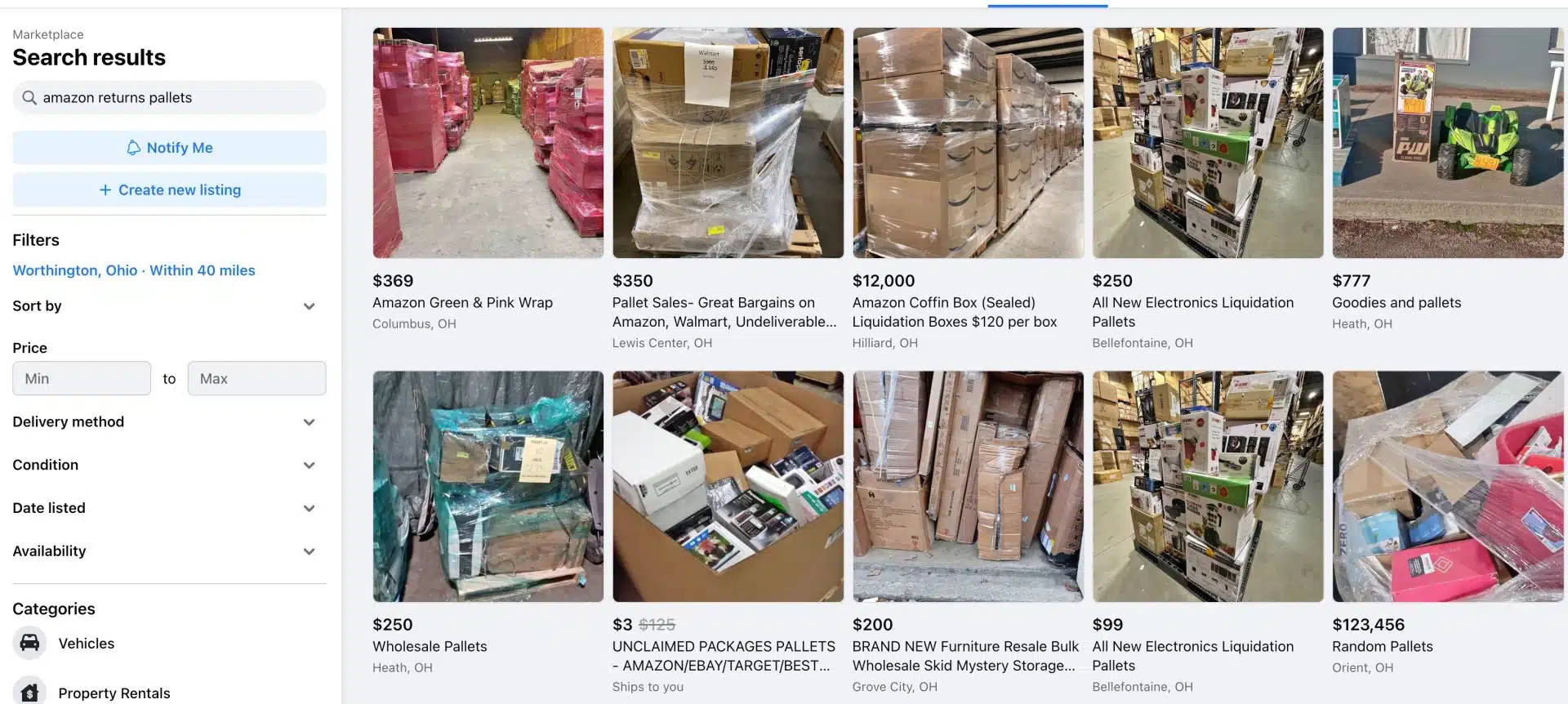
Starting with the most familiar app, Facebook, I'm sure everyone knows it. It's great for finding pallets that are for sale in your area.
Use Facebook Marketplace and search for "Amazon return pallets." Facebook will fetch the most relevant results, and you can apply filters for your ease.
- Apply the location filter and add your area to get the results from nearby sellers. It'll reduce your shipping costs as well.
- If you are on a budget, add the minimum and maximum prices. You can also sort them based on pricing.
- You can also filter out based on listing date and delivery method. Also, do check availability before proceeding.
- If you have any category in mind, select it. For example, you might want pallets related to beauty products, vehicles, or more.
- Using the condition filter, you can prevent getting broken merchandise and get the ones in good condition.
- Turn on the notifications to get alerts in the future when someone adds a new return pallet.
There are also several Facebook groups where return pallets are posted regularly. Some are for a specific category, like beauty, and home products, while others are miscellaneous items. You can join them and keep an eye out for potential deals.
2. Direct from Amazon Sellers
Many Amazon sellers have returned pallets for sale, and you can find and offer them. Locate the FBA sellers on Quora, Reddit, or Facebook groups. Don't be surprised if you find sellers a few miles away.
Remember that your products are untested and can be in any condition. They might be ready to sell or need minor repairs. Before purchasing return pallets, you can discuss the potential risks with the seller.
3. BStock.com
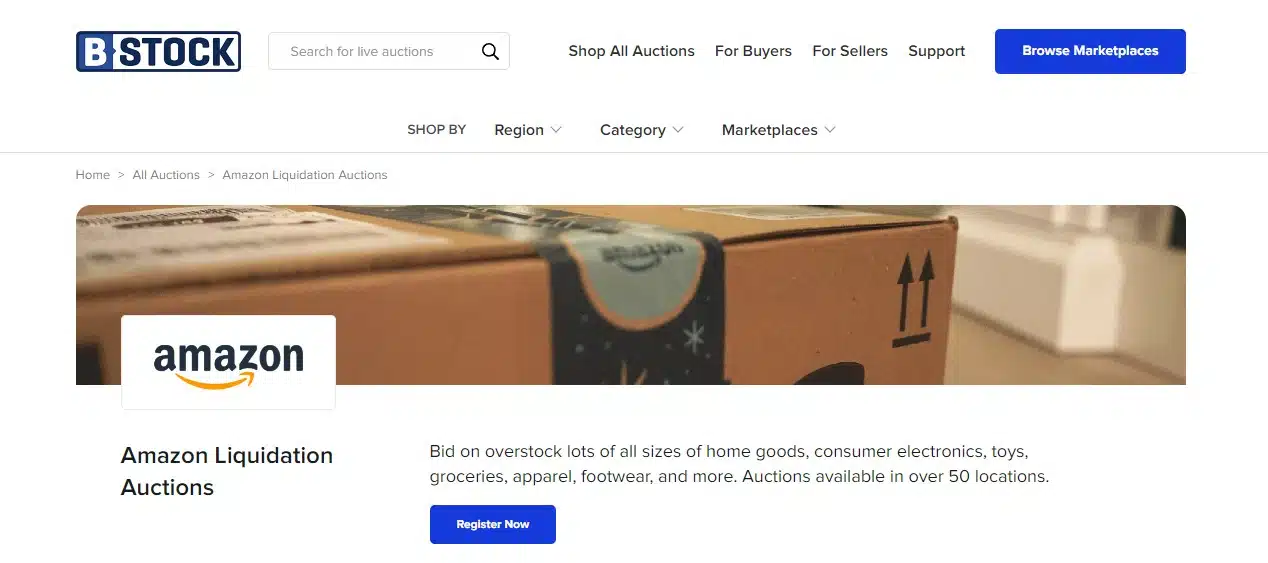
For resellers and shoppers, B-Stock allows them to bid on returned products from different categories. They include footwear, apparel, toys, groceries, consumer electronics, and home goods. With more than 50 locations, you can easily get Amazon liquidation pallets. Registration with email is a must before proceeding.
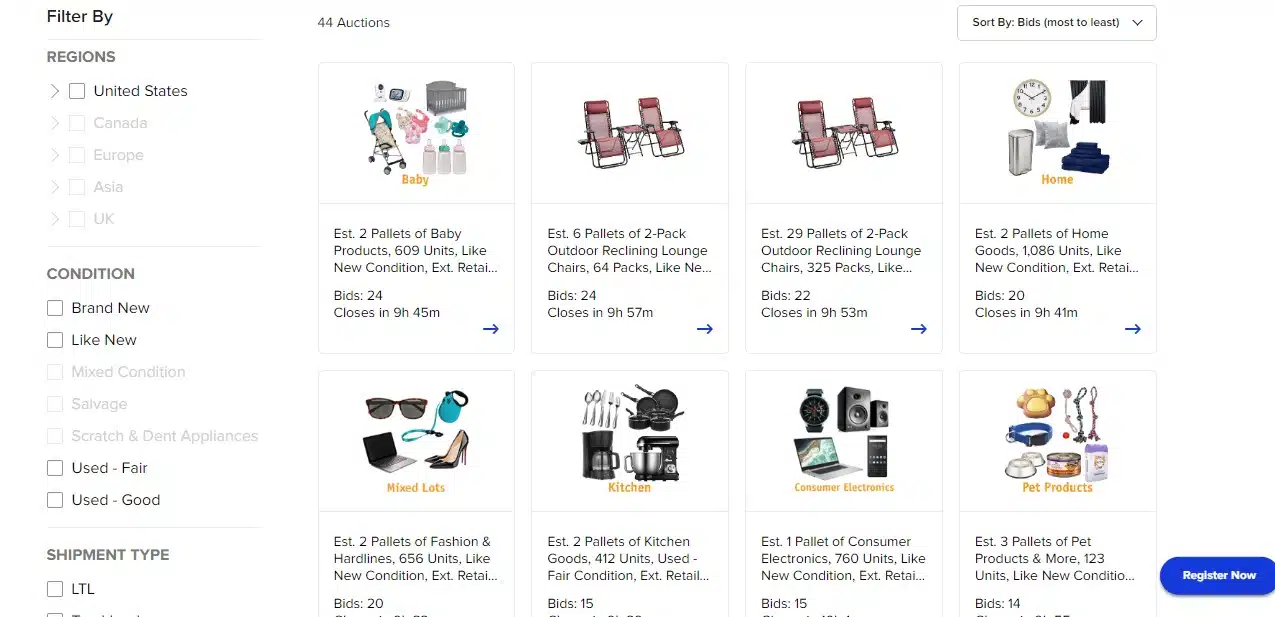
You can sort the bids by options like closing soon, newly listed, most to least, and least to most. Then, select your region (e.g., United States), the condition of liquidated merchandise, and shipment type. Choose from brand-new to fairly used options, and you'll be ready with Amazon pallets.
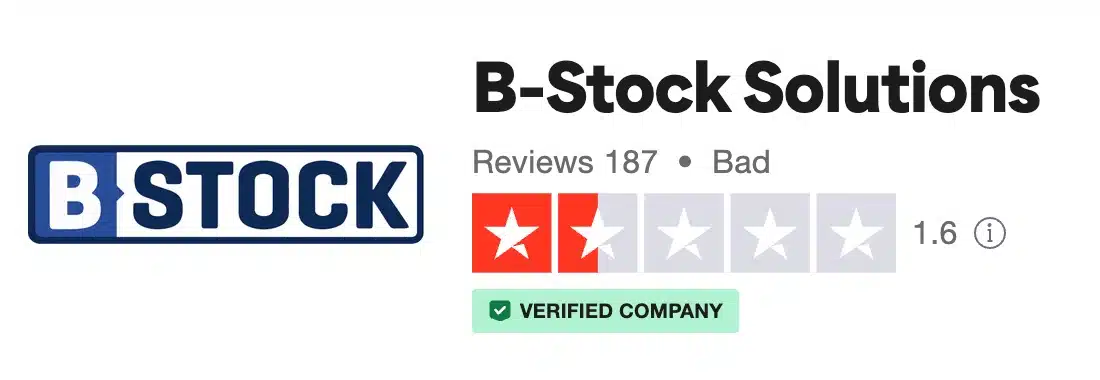
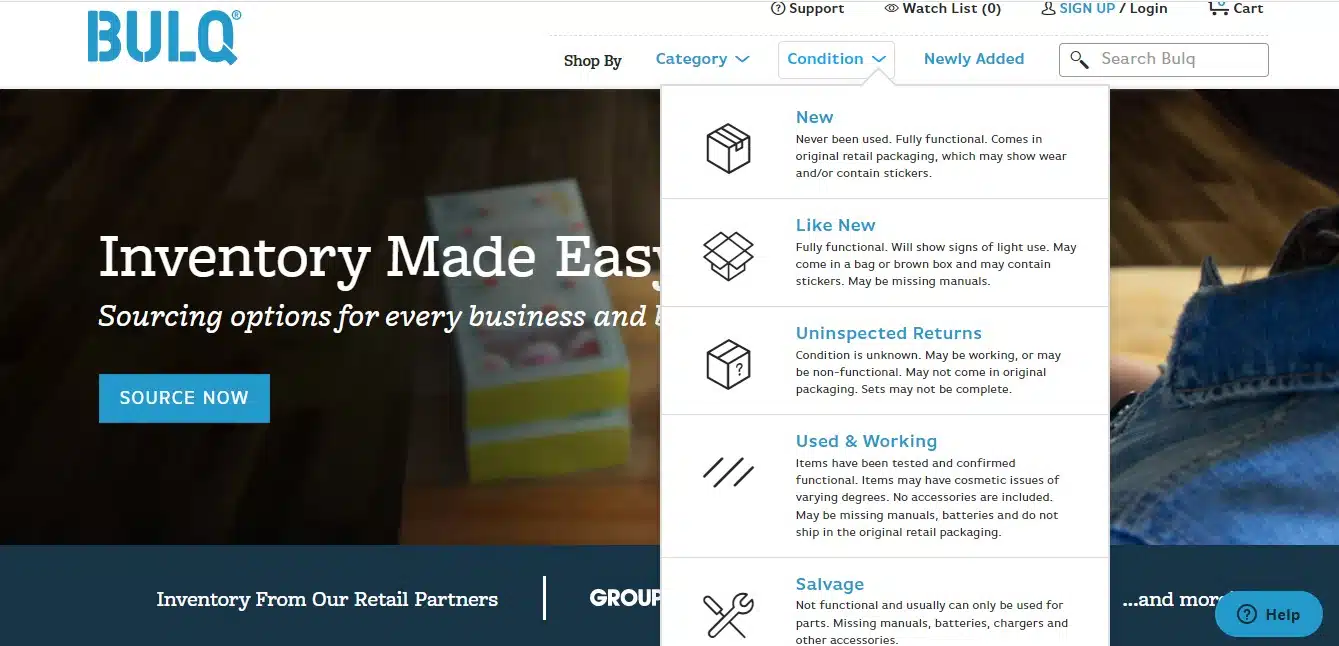
Another great option for buying returned online purchases is Bulq. The plus point is that they don't launch Amazon liquidation auctions. Instead, if you like any merchandise online, add it to your cart and purchase it. Comparing other liquidation companies, the visibility of products is much better.
For example, you'll get an exact price, shipping costs, inside contents of the pallet, descriptive photo, and other lot details. Still, like Amazon customer return pallets, the sets may be incomplete, and the product may be non-functional or broken.
Still, filters on site allow you to opt for brand-new merchandise and customize your experience.
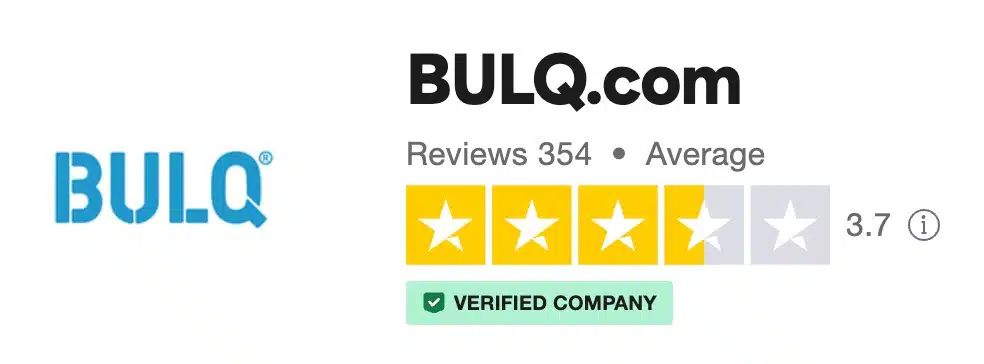
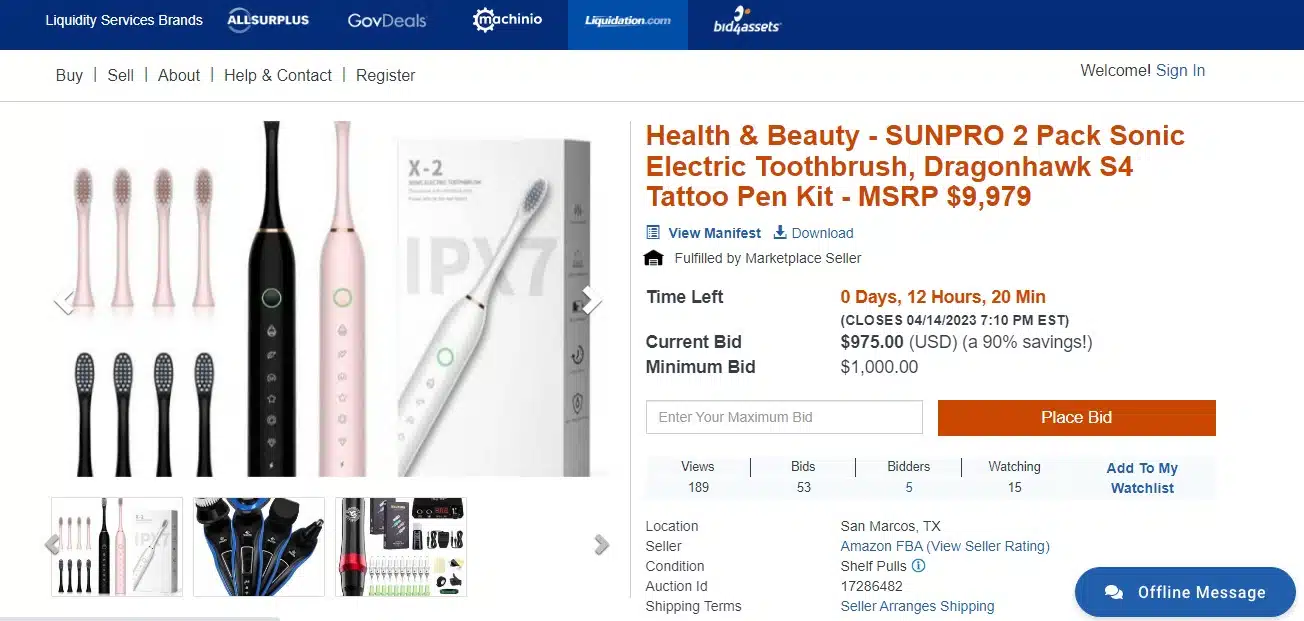
Another company that sells Amazon return pallets and overstock merchandise through liquidation auctions is Liquidation.com. The company is an Amazon Return Pallet partner with several available buying options.
For condition, you can choose from:
- Returns
- Salvage
- Overstock merchandise (Shelf-pulls)
The categories are diverse, and you can go on each bid to check the details.
You can find the time left, current, and minimum bid on the main page. Then, you can enter your amount to place the bid.
There are complete details of unit highlights, what's inside the package, and shipping information. Do read all the terms and conditions before proceeding.
Being an Amazon return pallet auction, it'll be a great deal if you get a pallet with zero bid. Otherwise, you may bid up higher than the pallet's worth. So, take your decision wisely.

Check current Amazon pallets for sale on Liquidation.com here.
The Liquidation.com reviews aren't the best, so make sure you assess whether they are the right fit for your business.
6. DirectLiquidation.com
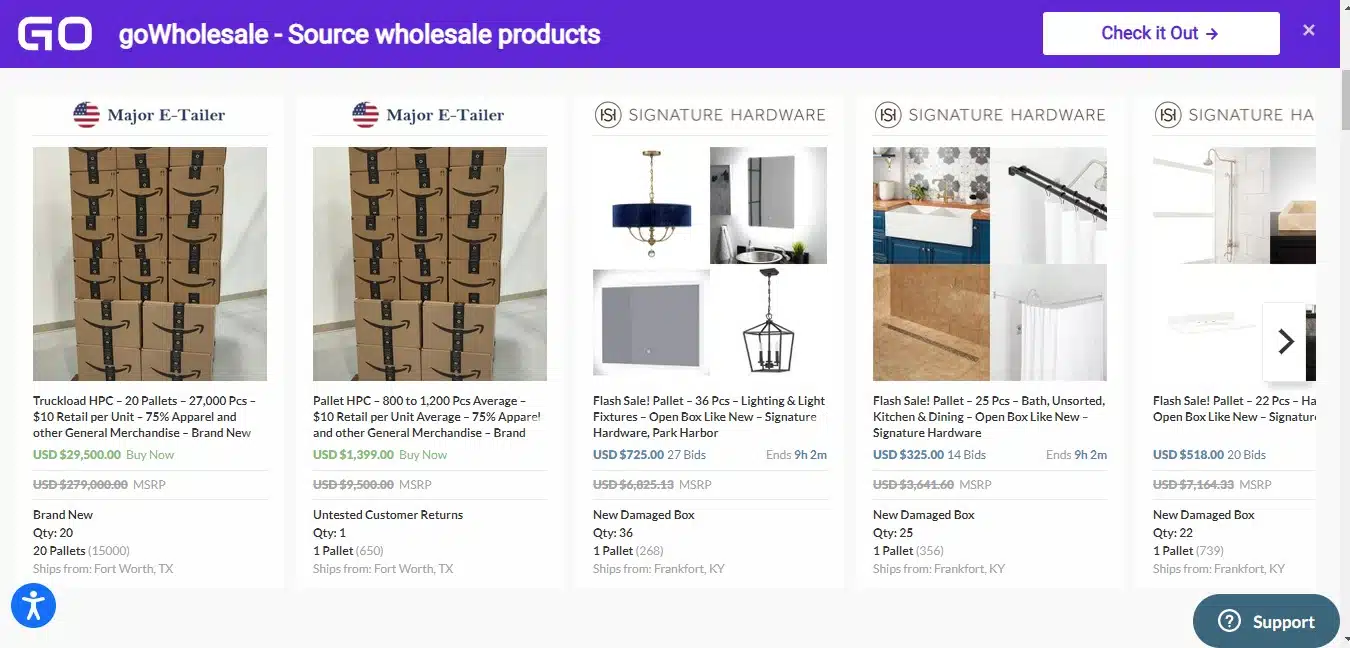
Direct Liquidation is a great place to buy overstock merchandise directly. You can shop depending on the department, like baby, automotive, home, jewelry, or more. For any budget, you can filter out your desired pallet with flexible shipping options and load sizes.
Also, there is an option to connect with retailers directly and purchase customer returns and surplus inventory. Being associated with names like Lowes and Walmart, you can search products by brand names. Vendor selection is a great feature, as you can only get the results of the store you want.
But remember that the pallet information the company provides is limited, and sales are done through auction. You need to be extra vigilant while taking the risk of bidding.

Learn more about how to source Amazon return liquidation at DirectLiquidation.com here.
7. 888Lots.com
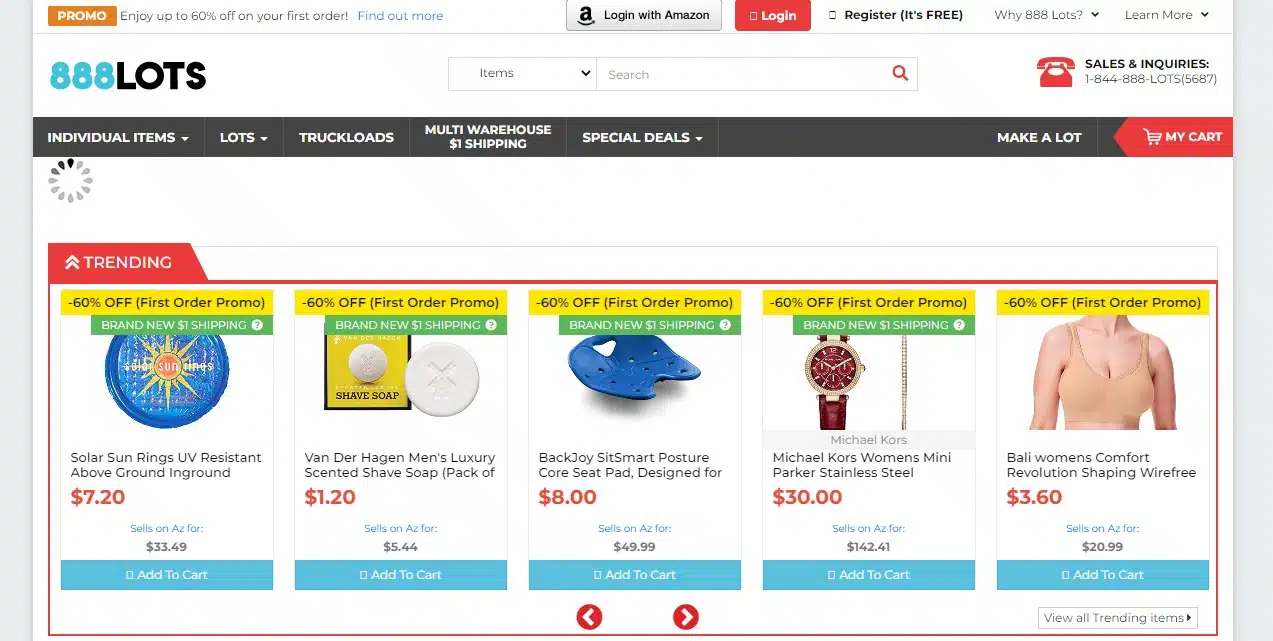
The company is located in New Jersey and offers greatly discounted prices for nearby resellers. If you're from the East Coast, you might not be able to take benefit of low pricing due to high shipping costs. The selection of Amazon pallet sales, closeout merchandise, and overstock products is great; you can even buy individual items.
Though the company is small, you can check it frequently to get the best resale value through discounted products. For US-based customers, a valid resale certificate is needed. Non-US residents need to submit a valid business registration certificate.
The discounts on the merchandise are quite good but remember that the materials can be damaged. You can utilize their Amazon profit calculator tool to calculate the worth of the package. Also, you can estimate and get a further idea with the product description of what's inside the pallets.
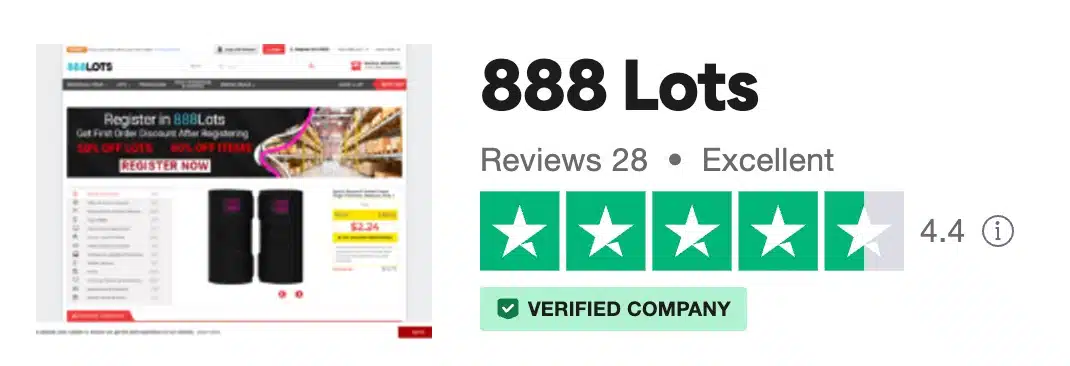
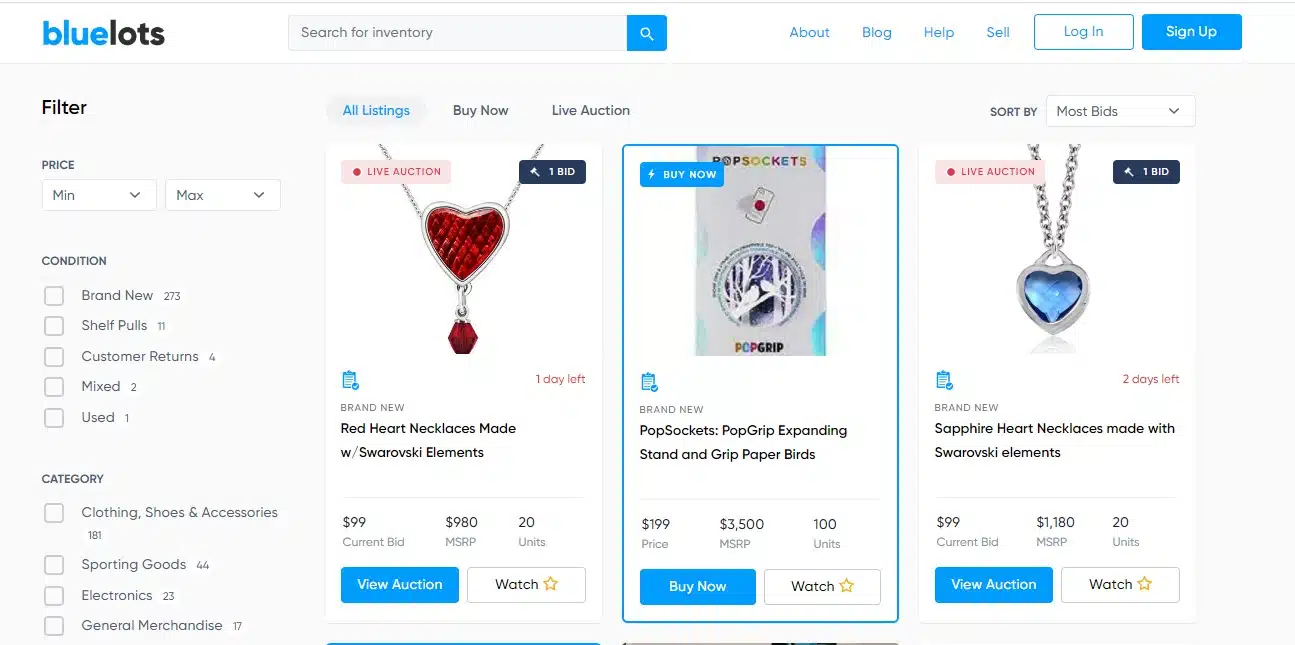
A US-based company BlueLots, allows you to buy liquidated merchandise from Amazon Returns and other large retailers. A big plus is that there is no buyer fee involved while purchasing. Instead, they charge retailers directly.
The sales work on the auction model and pallet details are described in the description section. You can also try the filters for the condition of the product. Whether you want to buy shelf-pulls, return pallets, or brand-new ones, select your category, and you'll get the results.
Also, you can choose from pallets vs. parcels and add the minimum and maximum prices. The shipping options are also diverse, including FedEx, UPS, and USPS, and you can expect to pay 300-400$ fee depending on the package weight. No sign-up is needed for browsing, but you need to create an account first for purchasing.

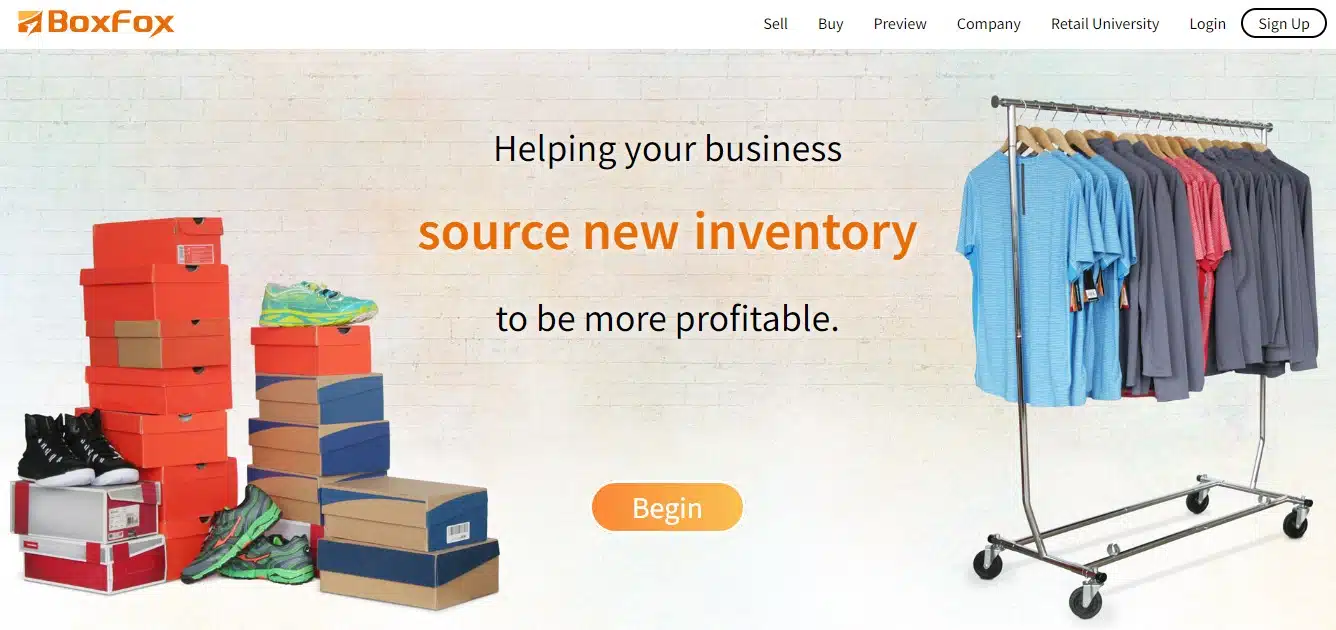
Boxfox sells products directly from retailers like Amazon warehouse. You can register for free and keep track of auctions using their app. The company stands out due to its excellent product condition as they only sell brand-new merchandise.
The main goal is to clear excess overstock inventory; each product has a specific appraisal value. The buyers can bid more or less than that specific value. Also, there is a 7 percent transaction fee and associated shipping costs.
The purchasing process is also quite safe, and your money will be in escrow till you're satisfied. The streamlined process allows for easy returns with a money-back guarantee.
For sellers, it's a great way to do clearance and set product prices. There is no obligation to accept bids if they are low then your asked price. Hence, providing immediate cash flow to run your business smoothly.

Check out BoxFox.co as an Amazon pallet buyer here.
10. CraigsList
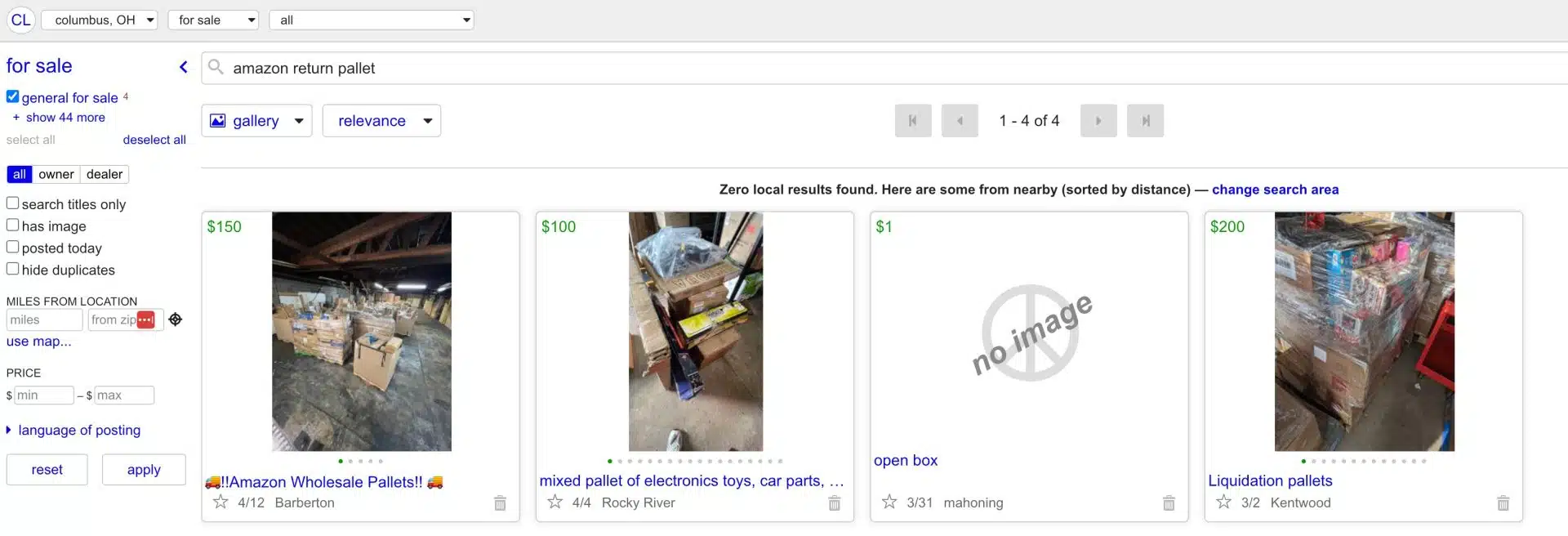
Despite having limited options, CraigsList is a great option for pallet pricing. You can get results based on your search area, and the chances of having a deal are solid. There is the option of adding categories like appliances, arts and crafts, aviation, electronics, baby, computers, and more. Select the miles from your location, add your price, and explore the results.
How Much Do Amazon Return Pallets Cost?
You can expect to pay $200-$800 for Amazon returned merchandise through liquidation platforms. For items having a high value, the price can go beyond $2000.
Several factors influence the cost of pallets, including:
- Pallet Category: The products from the home category will cost less compared to computers and laptops.
- Size And Weight: 200 pounds of groceries will cost less than 200 pounds of computer equipment.
- Location: Shipping costs add a lot if you get products from an area farther away from your residence.
- Item Condition: Shelf pullovers and brand-new products cost more than returned or repaired items.
- Liquidation Company: Some companies have fixed package prices, while others have auctions. Taking wise decisions is essential as it's a risk whether the product will be worth it.
Overall, it all depends on what you're purchasing and from where. Go for a reputable seller while considering all the risks.
What Is Liquidation Sourcing?
"Liquidation sourcing" refers to buying discounted inventory for resale from companies (or 3rd party middlemen called "liquidators") that are looking to turn inventory back into capital quickly.
There are a number of reasons a company would do this and it isn't always because they're going out of business. Liquidation might include goods that were returned, damaged, going out of season, overstock, discontinued, expiring or even recalled (yikes!)
Since the products are sold "as is" and (typically) in bulk (often by the pallet and by weight/category), they are always steeply discounted. The reason Amazon and eBay sellers are drawn to this isn't surprising at all. The liquidation prices are often less than the price online so there is plenty of margin in flipping the products.
Liquidation FEELS like wholesale and there is a much lower "barrier to entry" than there is when sourcing wholesale. This is because liquidators and companies liquidating their own inventory will typically sell to just about anyone with money whereas wholesalers do much more vetting of any company looking to work with them and buy their products.
"Liquidators can't be choosers," could and should be a saying.
For the love of God, liquidation is NOT the same as wholesale. At all...The only similarity is that the products might arrive on pallets. That's it.
Wholesale = Sustainable and scalable
Liquidation = Not scalable because it almost always leads to suspensions.
Wholesale is my most recommended method of sourcing and liquidation is my second to last recommended method, behind stealing from pawn shops.
I'm joking of course, but seriously, it is my least recommended method of product sourcing.
What Can You Expect From an Amazon Pallet Sale?
Amazon return pallets usually sell in bulk, and the package may include multiple products from different categories like home, self-care, baby, automotive, computers, and more. Some bundles may be categorized, while others may contain random items.
So, let's suppose a pallet contains 10 home-related products. The retail price may be around 2000-2500$, but the pallet bids will be around 250-300$. This way, there's the potential to earn a lot.
But remember, not all the items will always sell at the original price. Some might be damaged and need repair. Others may be faulty and only parts when can be sold, while few can be brand new and sold as it is.
Why Liquidation Sourcing Is Risky
I'm being harsh on liquidation sourcing so far so it's only fair I explain why finally.
Reason #1 Product Quality Concerns
Liquidation goods can be off quality for a number of reasons.
First, the liquidators are not likely to care about the quality of the goods anymore ESPECIALLY the ones in boxes. This isn't of course always the case, but its absolutely a reasonable assumption to make and at scale, you're bound to experience some very neglected and haphazardly handled products.
You may be thinking, " Well if it's broken or damaged, I just won't buy it! Problem solved!"
Yes, you absolutely shouldn't buy products that you see are damaged, but it's difficult to tell what the full story is on each item.
I have seen on countless occasions sellers receive "incomplete" or "wrong item" complaints when they were certain the product was as described.
While I am well aware than many customer complaints are in fact exaggerations, misunderstandings, issues in shipping (not the seller) or just flat out lies, I'd be lying if I said I didn't notice that liquidators and thrifters were getting far more of these complaints than their peers who purchase the products from wholesalers or more legitimate sources NOT as liquidation lots.
When you get a pallet of liquidation goods or receive hundreds at a time, stacked on top of each other, outside of the original factory seal and wrapping, it's difficult to really know if something has possible issues.
How do you know if a product is not functioning or maybe covered in blood because it was used in a murder unless you opened the box and checked (kidding again, seeing if you're awake).
Reason #2 No Paper Trail
Like I said earlier, I understand that many customer complaints are exaggerations, misunderstandings or even flat out lies to get free shipping.
Legitimate or not, Amazon adopts a "guilty until proven innocent," policy when it comes to quality concerns and especially authenticity concerns.
What happens when you get one of these complaints and Amazon shuts down your account? They ask for invoices showing where you got that specific item.
Most liquidators offer generic invoices that don't provide a good itemization of the products included and even more rarely have the products listed on an invoice with UPCs.
This is a big problem.
Reason #3 Often Less Profitable Than Expected
Each liquidator or liquidation sale you buy from is different but many of them make it difficult to see exactly what you're getting.
Pallets may be labeled as "electronics" or "power tools." When you start cracking into the haul, you may notice things like the fact the product has no listing, an extremely low price after fees, etc.
Just because something is "cheap" doesn't mean it's profitable. Also, many of these pallets have already been picked over by the seller and all of the best items are gone.
5 Tips for Liquidation Reselling
If you're going to do liquidation sourcing for reselling, follow these tips.
Tip #1 Inspect the Products Thoroughly
No matter what you're told about a lot, only trust what you see with your own eyes. Once you have a good reputation built with a liquidator and you're 100% certain you're getting grade A products (no repackaged crap) you can begin to let your guard down a little.
After all, it's difficult to scale if you're paranoid about every single item you sell. With liquidation, I've seen enough seller's suspended to know that paranoia is absolutely merited.
So, if you're properly inspecting all your packages, you're inevitably going to find some off quality products. What do you do with them?
There are many levels of "off quality" and Amazon draws the line at "Used-Acceptable" which is defined as:

Side Note: I highly recommend you brush up on the Amazon Condition Guidelines after you read this article.
The problem with selling products as "Used-Acceptable" is that they are often slow moving and obviously, priced lower!
This means there is a real temptation to fudge the listing and exaggerate the quality of the product in order to make a little more, a little sooner.
Never overestimate the quality of your products! ALWAYS underestimate. This is your business, don't risk it over the occasional extra few dollars here and there.
Personally, "Used-Acceptable" is also risky because buyers might forget they didn't get brand new quality and might still make complaints that will hold just as much weight as if you listed the item brand new.
For this reason, I believe that most products that would be listed as "Used-Acceptable" are much better suited for being listed on eBay.
Tip #2 Sell off Quality Goods on eBay with CLEAR and ACCURATE descriptions, not Amazon
The reason eBay is a better option is because it gives you the flexibility to add images showing the exact condition your product is in whereas Amazon doesn't allow you to add pictures of your specific condition of the item listed.
You could basically sell a turd on Amazon as long as you don't describe it as a meatball sub on the listing. I'm kidding, but you get the point.
Clarity and honesty are king and eBay allows you more flexibility to do that compared to Amazon. Also, eBay isn't as quick with their version of the ban hammer like Amazon is so that's a plus as well.
Tip #3 Try to Get an Itemized Invoice
Regardless of what you've been told, Amazon doesn't really like liquidators and when your invoices clearly show that you're sourcing from one, it isn't a good look.
Not a death kneel, but just not a great look.
Here is another random tip before I forget to add it...
Tip #4 Don't Put "Liquidator" in Your Store Name
I was actually inspired to write this article after reading an article on CNBC.com about a company that was suspended. Their name ... Cheapskate Liquidators.
Here they are.

Side note, notice the damaged packages in the picture? It's the little things that add up, folks.
Tip #5 If You INSIST on Liquidation Sourcing
Don't source 100% liquidation
If you find the occasional liquidation sale that has great products, itemized invoices etc. by all means, knock yourself out BUT don't put horse blinders on and only search for liquidation deals.
There is some cream, but there is a lot of crap and if you spend 100% of your energy and time in liquidation, you'll inevitably buy some crap in an effort to scale.
I do think most people who sell strictly from liquidation lots will get suspended eventually. I also believe that most of them will also get reinstated, but the process is a pain in the butt and can take a lot of time if you don't know what you're doing. And you don't, why would you?
Is Buying Amazon Return Pallets Worth It?
Some people have successfully bought Amazon return pallets, while others have found them too much trouble. It is important to research the pallet and the items it contains before making a purchase. Below here are some of the reasons:
Other Product Sourcing Models
Ok, I'm done bashing on liquidation.
If you're a liquidator or source from one, please don't take this as a dig at your business. Also, if you're a liquidator, consider these safer alternatives to liquidation.
1. Direct from Retail Sourcing
It doesn't get much better than buying the product straight from the source. Suspensions are nearly impossible and in the event that you do get suspended for an inauthentic claim, you'll have a perfect invoice to provide to prove that you're right and the customer is wrong 🙂
The only downside to this is lower margins but the plus side you can get extremely popular products that sell quickly and have large companies spending a fortune marketing them FOR YOU.
Also, many brands are gated to other sellers so if you get a direct source and direct brand approval, you can crush them.
2. Wholesale Sourcing
The difference between wholesale sourcing and direct from retail sourcing is the middle man, the wholesaler who purchases items, warehouses them and sells them for others to resell. Manufacturers benefit from wholesale companies storing their products. They are also able to optimize their shipping by selling to wholesalers across the country or world instead of shipping from one or few centralized locations. Wholesalers then resell to other companies who have storefronts to move the products for them. Wholesalers typically don't worry about having a "front of shop" presence since they can sell to companies that do and capitalize on economies of scale (smaller margins but large orders).
Remember, wholesale is NOT the same as liquidation. Wholesale is much more reliable and the goods you receive will have a paper trail DIRECTLY to the manufacturer.
#3 Online Arbitrage
This is my personal favorite sourcing method even though it lacks the scalability of wholesale and direct from retail sourcing.
Why? Online arbitrage is convenient. You can do it literally from anywhere. If you incorporate a 3rd party prep and ship company, you don't even have to see the products!
Also, tools for online arbitrage exist that make the process easier than ever. Tools like Tactical Arbitrage have made it easy for almost anyone to find products to sell on Amazon.
#4 Retail Arbitrage
Retail arbitrage was the first sourcing method I ever tried and it worked well. It is very hands on and requires you to do a lot of driving and scanning but the products and profits are there. Scalability is the only issue but you can still make a very healthy living with retail arbitrage.
#5 Private Label
Private label is the process of creating your own products and selling them on Amazon. Typically, these are not original and groundbreaking invention type products but rather "me too," sorts of things (kitchen supplies, pet supplies, garlic presses) that have profit potential if you can rank high on Amazon for them.
This isn't an easy method or I might have had it ranked over arbitrage. There are some great tools like Jungle Scout and Helium 10 hat make finding profitable products to bring to market much easier.
#6 Thrifting (Not Recommended for Amazon)
I recommend thrifting for eBay and other marketplaces, not Amazon. The only products I'd really consider selling on Amazon that were from a thrift store would be books or the occasional RARE sealed item that is with out a doubt unopened.
#7 Garage Sales (Not Recommended for Amazon)
A garage sale is just dumpster diving a day early. Just kidding...Again though, I wouldn't sell anything from a garage sale on Amazon except the rare unopened, factory sealed product someone happened to have as a gift they never opened or books (which you wouldn't sell in brand new condition of course).

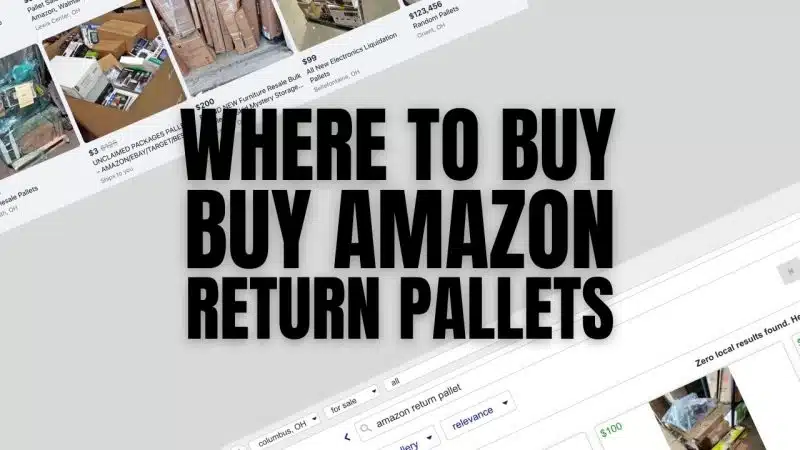
If your business is having problems and you cannot cope with it, you should speak to a financial adviser, but if you know for sure that you want to let go of the business, liquidation is a simple process and you will no longer have the worry of keeping it going, you will be able to get on with your life.
I feel personally attacked! Just kidding, as someone who has bought 30+ truckloads of liquidated merchandise over the last 3 years it’s without a doubt not conducive to online sales, especially Amazon. I focus on low count, high dollar truckloads that are typically large items. About 90% of what we bring in is new but shipping is out of the equation as it would kill our margins. Sellers that do clothing may find success sourcing in liquidation though.
Whereas I found this post informative, I do feel that the majority of sellers who are willing to pony up and spend 200 to 600+$ know deep down that they aren’t going to return their investment selling on a new product warehouse retail site like Amazon. I would hope that it is fairly common sense when about 1/4 to 1/5 of these liquidation come from Amazon or Amazon sellers, meaning they specifically don’t want to resell or vet those products. I feel that the majority of the people who buy these display them on websites like Ebay, Offerup, and Craigslist, as these websites have fewer quality standards, and would be more interested in a comparison of these sites than Amazon
Stealing from pawn shops is what got me in trouble in Arizona!Great post. I agree about liquidation for amazon. It’s perfect flea market sellers, not so much for legit business online.